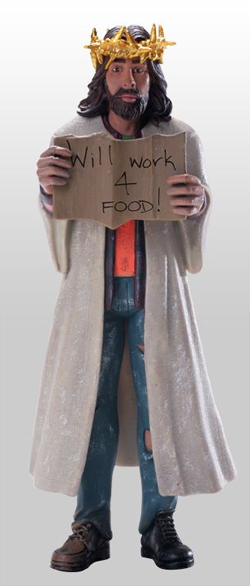Seeing that as the First Adam was created to WORK, so it was with Jesus. For even He had a JOB/PROFITABLE trade and handled his buisness. As mentioned before..
Again, its an issue of progression of time.........and the fact of build-up---no different than what happens today when one starts out small/cannot afford to miss work because they're trying to make it...but they build up in time to where they can/their offspring can out do them----with it being possible for them to do more things than their predecessors.
As far as finances, seems logical/reasonable that while He was a carpenter, prior to His ministry, that He did pretty good - needs were met, nobody starving, a standard middle class carpenter. But He was not "filthy rich" in the financial department regarding how riches were measured in that time period.
And He was not "dirt poor" either. Even when He left the profession and began ministry (which did not happen for at least 18 years), His needs were met. And the disciples needs were met, too. I believe much of what Jesus was trying to teach His first disciples was how to be totally dependant on God without relying on their own skills or trades (even though they can come in handy), but rather to rely on faith in God. That's not to say that they didn't work from time to time, but that God did provide, one way or another. With Jesus, there will always be provision. There is the reality, of course, that many often say things akin to how those truly following Christ would NEVER be rich---even though they still seek to live at a prosperous level of income/life....and by nature, doing things that show they wish to be prosperous. The fact of Christ multiplying resources on MULTIPLE occasions is something I'd think would be demonstration that He was able to take care of buisness...(
Matthew 15:28-30/
Matthew 15 /
Mark 8:1-3 /
Mark 8 /
Matthew 14:12-14 Matthew 14 /
Mark 6:29-31 /
Mark 6 /
Luke 9:9-11 /
Luke 9 /
John 6:1-3/
John 6 , etc). It was never the case that Jesus ever had to deal with or even face STARVATION & BEGGING FOR FOOD......and even the Devil noted that He could feed Himself at ANY time He so desired due to His Provision via the Father/Holy Spirit and Being God...as seen in the temptation of Jesus in the wilderness,
Matthew 4:2-4 Matthew 4
With multiplication of resources, I'm always amazed seeing the issue of quality verses quanity---for when Jesus did the miracle at the wedding at Cana in
John 2 , indeed, it was not just a matter of wine being multiplied since that would've been nothing special...just as resources multiplied in/of themselves are not special if not done with quality/reliability. Jesus made the BEST WINE for the event...and likewise, it's always amazing to see Him multiply his BEST for His Glory
But again....not suprising...as that's the essence of Biblical Prosperity. Jesus's ministry had all it needed and even weeks of operating cash. When taxes were due, He sent Peter fishing - not the nets of fish to sell, but a solitary fish. When they were faced with sending people off hungry, they blessed a handful of fish and loaves and fed thousands of people. THAT is prosperity,
reading this makes me wonder why even in the conclusion there can not be some middle ground, I mean, why is it necessary for Jesus and the disciples to be either wealthy or "dirt poor" why not, just poor? why not just well off? why not needs met? Why only the extremes?
If you would cease assuming that others are not for such, then perhaps there'd not be a problem.
For the reality is that, if reading all of what I've said, that "rich" and "poor" can have varying levels...and that it doesn't mean that Jesus was "living luxurious" when one says that he was "rich"---no more than it'd be for me living in middle class/saying "I'm not RICH!!" despite how I have a car, running water, T.V. and many other things others around the world would consider "high living". And many times, appearances can be deceiving
Again, it's you...and ONLY you..that is reading extremes into the issue.
18 Then I realized that it is good and proper for a man to eat and drink, and to find satisfaction in his toilsome labor under the sun during the few days of life God has given himfor this is his lot. 19 Moreover, when God gives any man wealth and possessions, and enables him to enjoy them, to accept his lot and be happy in his workthis is a gift of God. 20 He seldom reflects on the days of his life, because God keeps him occupied with gladness of heart
Ecclesiastes 5:18-20Ecclesiastes 5
(in Context)
One reading the life of Solomon (who was exceptionally rich/wealthy) and seeing his perspective in Ecclesiastes gives a more complete view to the issue of prosperity, IMHO, when it comes to the way many in WOF use it (i.e. "LIVE LIKE A KING'S KID!!! GOD WANTS YOU RICH ALL THE TIME!!!"):
Ecclesiastes 1Ecclesiastes 2 , Ecclesiastes 3, Ecclesiastes 4 , Ecclesiastes 5:10-17, Ecclesiastes 5, Ecclesiastes 6, Ecclesiastes 7 , Ecclesiastes 8 , Ecclesiastes 9 , Ecclesiastes 11, & Ecclesiastes 12
Others are found within I Timothy 6 when it comes to rich believers and their responsibilities. Though even on that, it's odd seeing what we often set up as the indicators for whether or not a person's rich. If they have "bling" and much accessories, then they're rich. But funny seeing that many people who're truly rich we probably would never suspect or know about unless they told us. One kat I know of was apparently a Custodian....the man didn't look like much/seemed to be lower-class, and in his apartment complex, the landlord would always bully him/despise him due to his social status. Ironically, however, the Custodian was actually richer than the landlord due to the IMMENSE revenue he recieved from doing the job no one else would do with cleaning waste/garbage.....and he apparently collaborated with other Custodians to form a Union/Go on strike. People were helping to fund the Custodian/benefits were coming in unusual ways.....and all of it would've never been noticed due to how the custodian chose to LIVE ON FAR LESS than his financial means warranted.....
What people on the thread (as well as myself) are responding to is primarily the thought others try to say when making it out as if Jesus
was a pauper and not for Biblical Prosperity as taught in much of WOF
At times, what others often say seems to be in line with what's taught in Asectism theology---which is unfortunate ....as this is the image IMMEDIATELY coming to mind regarding how many see the Lord:
To be clear, the concept of "POOR Jesus" is not just a WOF issue---as I know of other circles that hold to the same. It's very prevelant in the Emerging/Emergent Church camp when it comes to working with the impoverished and the mentality that CHrist went against our common views we have of Him today. Don't know if I have the right book in mind, but I believe in "Velvet Elvis" by Rob Bell there was the view placed forth that the robes CHrist will come back in will be dirty like the homeless ones He had growing up rather than pure/spotless and looking nice
__________________
Also, on the issue of Christ owning a home, some more info to consider, AS BEST SEEN in
Did Jesus have a house in Capernaum - NT Blog:
I've always been intrigued with this verse in Mark, as suggesting that Jesus may have had a house in Capernaum:
Mark 2.15: [FONT=palatino linotype, Gentium, Cardo]καὶ γίνεται κατακεῖσθαι αὐτὸν
ἐν τῇ οἰκίᾳ αὐτοῦ καὶ πολλοὶ τελῶναι καὶ ἁμαρτωλοὶ συνανέκειντο τῷ Ἰησοῦ καὶ τοῖς μαθηταῖς αὐτοῦ ἦσαν γὰρ πολλοὶ καὶ ἠκολούθουν αὐτῷ[/FONT]
And it happened that he was reclining
in his house, and many tax collectors and sinners were reclining with Jesus and his disciples, for there were many who were following him . . .
This may be an example of the criterion I was recently discussing,
accidental information, or material given away in passing, where a piece of data (here: Jesus had a house in Capernaum) is assumed and not narrated. However, there is another way to take the verse. Is Mark intending the reader to take the [FONT=palatino linotype, Gentium, Cardo]αὐτοῦ[/FONT] (his) with reference to Levi, who has just been called to follow Jesus? This is the way that most commentators across the centuries have taken it, but I suspect that this is under the influence of Luke, who makes this a great party in Levi's house (
Luke 5.29). Incidentally, I can't help wondering how Levi had the resources to finance this big party if he had just left everything (
Luke 5.28); perhaps it was long last big bash with his old mates before setting off on the road with Jesus; or perhaps by "everything", Luke means his career and his means of earning a living (cf. the same pattern in the Zacchaeus story in
Luke 19.1-10, where the tax-collector is called, and Jesus invites himself to tea).
But Mark's text encourages the reader to imagine Jesus hosting the party at his own place in Capernaum. After all, he has just asked Levi to follow him (
Mark 2.14) and from that point onwards, Levi is absorbed into the anonmymous following disciples group in Mark, not even listed as one of the twelve in
Mark 3.13-19.
Mark 2.15-18 is a new pericope in Mark, and it is probably Mark himself who has bolted this pericope onto the Call of Levi in 2.13-14, in which case he may well have inherited this tradition about Jesus partying in his house without a link with the Levi tradition.
I am not sure why we should be surprised at the note that Jesus may have had a house in Capernaum. After all, Capernaum does seem to be the hub of his mission in Galilee. Perhaps we allow ourselves to be seduced by the saying in
Matt. 8.20 //
Luke 9.58, "Foxes have their holes and the birds of the air have their nests . . ." But even if Jesus said that, we don't know when he said it, and it could reflect a later, itinerant stage of his mission.
If Jesus the craftsman had a career in Capernaum, perhaps this is how he got to know those later to become his disciples.
If
Mark 2.1-12 also depicts Jesus at his house (2.1, [FONT=palatino linotype, Gentium, Cardo]ἐν οἴκῳ[/FONT], "at home"), perhaps that is why he says "Child, your sins are forgiven" -- they've just dug a big hole through the roof of Jesus' house and he's going to have to get up there later on to mend it.











